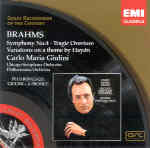Shortly after releasing this Brahms Fourth in its Giulini/Chicago box, it reappears in EMI’s Great Recordings of the Century edition, which is good news for listeners who want it all by itself (or in any event with more Brahms). It’s a very noble performance, a little soft around the edges in the outer movements perhaps, but nowhere near as droopy as the conductor’s DG remake with the Vienna Philharmonic. Here everything has a clear sense of direction, with real anger in the codas of the first and last movements and a gorgeous account of the Andante that never hangs fire.
Giulini’s Philharmonia version of the Haydn Variations is outstanding, with excellent wind playing and an imposing climax to the final passacaglia leading to a truly joyous windup. The Tragic Overture does strike me as a touch wanting in energy, more a function of rhythm than tempo. Ancerl, for example, gets more bite out of the music at an even slower speed, but this is still very good, and taken together it’s a very distinguished Brahms program, in well remastered, very listenable sound. I’m very glad to have it back.
































